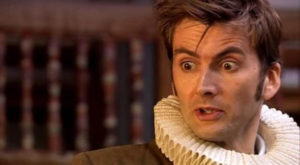 This episode is all about the power of words. And who better to feature in a language-focused story than the generally-lauded King of the Written Word, William Shakespeare!
This episode is all about the power of words. And who better to feature in a language-focused story than the generally-lauded King of the Written Word, William Shakespeare!
“By the pricking of my thumb / Something wicked this way comes”: Also appropriate is our antagonist(s), the Carrionites, who are for all intents and purposes, witches. Their power is found in language–an old magic, as the Doctor explains. And they use Shakespeare to pen words that reawaken that magic.
Is it too obvious to wax poetic about the rise in social media use where our careless attitude towards the words we speak is most recently noticeable? Things are especially volatile from where we sit in 2017 America following the most recent presidential election. But unfortunately, it is not a new thing, this arrogance, this firmly held belief that we have a “right” to be heard no matter who it hurts (funny how everyone has a right to be heard but no one seems to have the job of really listening).
The Doctor and the Carrionites talk about language as if it were old magic, the power of which is not known or used any longer. But if this magic has been neglected, we are shown that time has not diminished its power. Words do have magic. They have significant power to hurt or to heal. And almost any Facebook exchange today (not to mention YouTube comments) painfully reveals that human beings are like children wielding guns when it comes to words.
 The Bible knows well the power of the tongue. The Proverbs are full of wisdom about it–as much about its perils as the beauty and power therein (12:18, 13:3, 18:21, 25:11). The book of James cautions its readers that the tongue is like a wild animal that no human can control (3:8). The Psalmist is wise to beseech the Lord to watch his lips, to close those doors on his tongue and keep him safe from misusing the magic of language (141:3).
The Bible knows well the power of the tongue. The Proverbs are full of wisdom about it–as much about its perils as the beauty and power therein (12:18, 13:3, 18:21, 25:11). The book of James cautions its readers that the tongue is like a wild animal that no human can control (3:8). The Psalmist is wise to beseech the Lord to watch his lips, to close those doors on his tongue and keep him safe from misusing the magic of language (141:3).
In this episode, Shakespeare–a man whose words invigorate and inspire and bring people together–is easily manipulated into penning words that awaken great evil and endanger not only others, but himself. This is a wonderful picture of how easily our words can cross from helpful to harmful when are not watchful over the great and powerful gift of language. This is, after all, a great part of the problem with humanity’s use of words: we think we can control this magic.
We wouldn’t carelessly wave about a loaded gun or a razor sharp blade. We would be well served to keep in our hearts and on our tongue the Psalmist’s prayer “Set a guard, O Lord, over my mouth; keep watch over the door of my lips!” (141:3) for as a wise king once cautioned: “Whoever guards his mouth preserves his life; he who opens wide his lips comes to ruin” (Proverbs 13:3).


